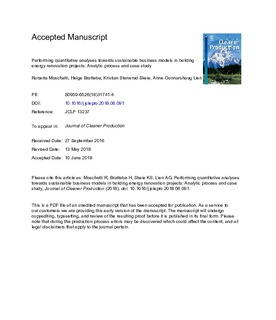| dc.contributor.author | Moschetti, Roberta | |
| dc.contributor.author | Brattebø, Helge | |
| dc.contributor.author | Skeie, Kristian | |
| dc.contributor.author | Lien, Anne Gunnarshaug | |
| dc.date.accessioned | 2018-09-05T10:52:39Z | |
| dc.date.available | 2018-09-05T10:52:39Z | |
| dc.date.created | 2018-06-19T15:21:52Z | |
| dc.date.issued | 2018 | |
| dc.identifier.issn | 0959-6526 | |
| dc.identifier.uri | http://hdl.handle.net/11250/2560918 | |
| dc.description.abstract | The building sector is responsible for several environmental impacts, as well as economic and social consequences. Hence, the adoption of energy efficiency measures in building renovation projects can lead to benefits to several stakeholders in a holistic sustainability perspective. However, these projects require a gradual shift of their business models towards sustainable business models. In particular, performing quantitative sustainability analyses can help to overcome the traditional focus of business models on economic value and customers by defining wider costs and benefits for the environment and the society. This paper first provides a review of the state-of-the-art of sustainability analyses and business models for building renovation projects. Then, it proposes an analytic process based on the execution of quantitative sustainability examinations, as a support for the project proposition, creation, and capture of sustainable value in a multi-stakeholder perspective. The analytic process is applied to a case study that is the energy renovation project of a Norwegian single-family house, and several sustainability criteria are computed for three possible scenarios that are inclusive of different energy efficiency measures. The paper's findings can be relevant for both practitioners and academics who search for new approaches to embed quantitative analyses into the business context of building energy renovation projects. Furthermore, the findings can represent the groundwork for the possible operationalization of sustainable business in such projects, striving for a systematic execution of quantitative sustainability analyses as a key step towards sustainable business models. | nb_NO |
| dc.language.iso | eng | nb_NO |
| dc.publisher | Elsevier | nb_NO |
| dc.rights | Attribution-NonCommercial-NoDerivatives 4.0 Internasjonal | * |
| dc.rights.uri | http://creativecommons.org/licenses/by-nc-nd/4.0/deed.no | * |
| dc.title | Performing quantitative analyses towards sustainable business models in building energy renovation projects: Analytic process and case study | nb_NO |
| dc.type | Journal article | nb_NO |
| dc.type | Peer reviewed | nb_NO |
| dc.description.version | acceptedVersion | nb_NO |
| dc.source.pagenumber | 1092-1106 | nb_NO |
| dc.source.volume | 199 | nb_NO |
| dc.source.journal | Journal of Cleaner Production | nb_NO |
| dc.identifier.doi | 10.1016/j.jclepro.2018.06.091 | |
| dc.identifier.cristin | 1592388 | |
| dc.relation.project | Norges forskningsråd: 226216 | nb_NO |
| dc.description.localcode | © 2018. This is the authors’ accepted and refereed manuscript to the article. Locked until 14.6.2020 due to copyright restrictions. This manuscript version is made available under the CC-BY-NC-ND 4.0 license http://creativecommons.org/licenses/by-nc-nd/4.0/ | nb_NO |
| cristin.unitcode | 194,64,25,0 | |
| cristin.unitname | Institutt for energi- og prosessteknikk | |
| cristin.ispublished | true | |
| cristin.fulltext | postprint | |
| cristin.qualitycode | 2 | |

